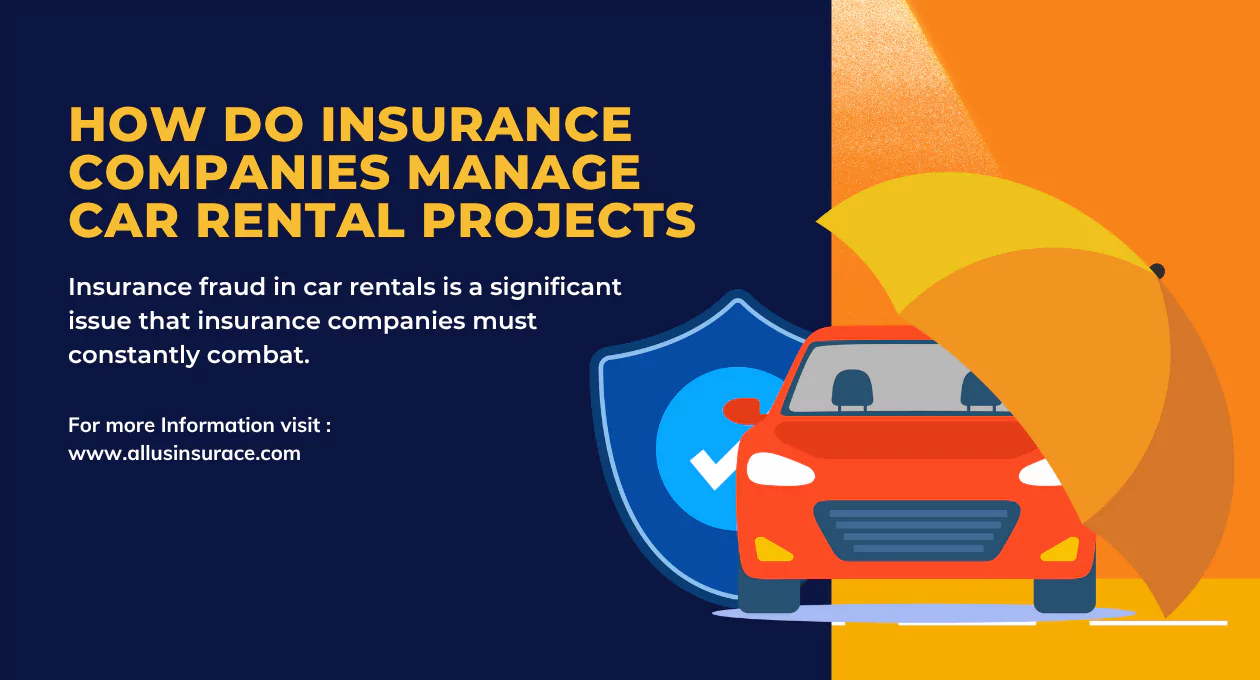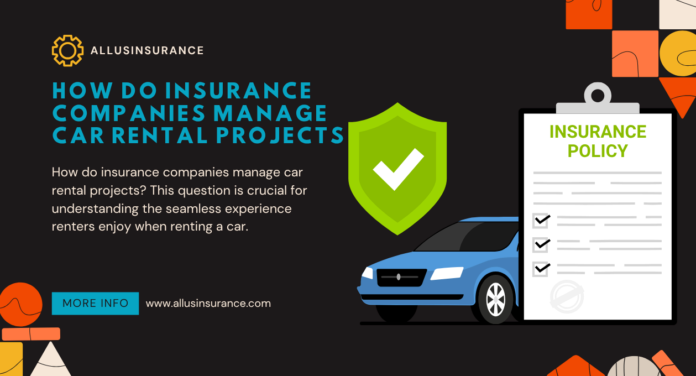How do insurance companies manage car rental projects? This question is crucial for understanding the seamless experience renters enjoy when renting a car. Car rental businesses face a multitude of risks, from vehicle damage to theft and accidents, and insurance companies are the backbone that ensures both the rental companies and customers are protected. Insurance policy for rental cars plays a critical role, covering everything from liability to rental vehicle damage coverage, offering peace of mind to consumers.
As car rental services grow in popularity, the relationship between rental agencies and vehicle rental insurance providers becomes more intricate, requiring careful risk management in car rentals. Insurance companies don’t just provide coverage; they assess risks, set pricing, and ensure that all claims are settled efficiently. Understanding how insurance companies manage these projects gives insight into the insurance processes behind car rentals and how they maintain smooth operations for both customers and businesses.
Introduction to Car Rental Projects in Insurance
The car rental industry is massive in the U.S. It generates billions of dollars annually as millions of people rent cars for business and leisure travel. However, renting cars involves numerous risks, which is where insurance companies play a critical role. Insurance companies help car rental businesses manage vehicle rental insurance by providing coverage for both accidents and unexpected incidents. This includes rental car insurance coverage, which protects both the car owner and the renter.
Managing insurance for rented vehicles involves ensuring that both the rental company and the customer are covered in case of accidents, theft, or damage. These partnerships between insurance companies and car rental services are a necessary part of the business. Insurance providers, in turn, need to evaluate risks, select suitable partners, and continuously monitor the performance of their rental fleet insurance management.
Understanding the Role of Insurance in Car Rentals
Insurance coverage types for rental cars vary greatly based on the needs of the renter, the rental company, and the location of the rental service. The role of insurance in the car rental industry is to protect both the renter and the car rental company from financial losses due to accidents, damages, or theft. Whether it’s liability insurance for car rental services or a rental car damage waiver, there’s always a solution to ensure everything is covered.
In this context, car rental insurance rates can differ based on the type of coverage. For example, basic insurance might cover liability, while more extensive plans could cover car rental accident insurance and rental vehicle damage coverage. In short, the right insurance ensures that customers can enjoy peace of mind when driving their rental vehicle, and the rental company stays protected from potentially expensive lawsuits or repair bills.
How Insurance Companies Select Car Rental Partners
One of the primary responsibilities of an insurance company is to select the right car rental partnerships with insurance providers. Insurance companies typically look for car rental businesses with a track record of managing vehicle rental insurance providers well. This includes evaluating their insurance requirements for car rentals to ensure that all proper coverage types are in place. Insurance companies are careful when choosing their partners, as a poorly managed fleet could lead to more claims, higher premiums, and increased risk.
Moreover, risk assessment in car rental partnerships is crucial. Insurers need to be sure that the rental company maintains vehicles that are in good condition and that their rental operations are secure. This is important for reducing the likelihood of insurance fraud in car rentals. A partnership built on trust and understanding of each other’s needs leads to smoother operations and better customer satisfaction.
Risk Assessment in Car Rental Insurance Projects
Every insurance company involved in managing car rental risks needs to assess the potential risks before offering coverage. This includes evaluating the condition of the vehicles in the rental fleet, understanding the locations where cars are rented, and knowing the customer profile. For example, a tourist renting a car in a busy city could pose a different level of risk than a local businessperson renting a vehicle for a short trip.
When it comes to managing insurance claims for rental cars, insurers must also consider environmental factors, the likelihood of car accidents, and the general state of the rental fleet. This thorough risk evaluation helps companies offer auto insurance for rental vehicles that appropriately matches the potential risks each car might face.
Pricing Strategies for Car Rental Insurance
Car rental insurance pricing plays a vital role in ensuring that both the rental company and the insurance provider remain profitable. Insurance companies must determine a fair premium that covers the risk but still allows customers to rent cars at competitive rates. Several factors influence the rental car insurance rates, including the type of car, the rental location, the duration of the rental, and the level of coverage the customer selects.

For example, renting a luxury vehicle or an SUV will generally lead to higher rental vehicle insurance providers premiums due to the higher risk and potential repair costs. In addition, factors like the customer’s driving history, age, and location play a role in pricing. Insurance companies use a combination of data, market analysis, and risk management strategies to set competitive prices while covering all potential costs.
Claims Management for Car Rentals
When a rental car is involved in an accident, both the rental car claim process and the claims settlement in car rentals need to be handled efficiently. Insurance companies need clear, streamlined processes in place to resolve claims quickly and fairly. This not only improves the overall customer experience but also reduces the administrative burden on the insurance company.
In the rental car claims process, the first step is often a report from the rental company about the incident. The insurance company must assess the damage, determine if the rental car loss damage protection (LDW) applies, and decide whether the damage is covered by the insurance policy details for rented vehicles. Once the assessment is made, the company can then proceed with claim settlement, either repairing the car, paying for damages, or offering compensation.
Technological Tools Used in Managing Car Rental Projects
In today’s digital age, insurance companies use advanced technological tools to manage car rental projects. These tools make it easier to track vehicles, assess damage, and evaluate risk. Many insurance companies now use apps to streamline the claims management for rental cars and improve the customer experience. Insurance policy for rental cars can also be purchased and managed through these apps, allowing users to make changes or file claims on the go.
For instance, rental car damage claims handling can be processed through mobile apps, reducing paperwork and speeding up the claims process. These tools also help insurance companies assess risks more accurately using machine learning and AI, which improve decision-making and the overall efficiency of the rental fleet insurance management.
Legal and Regulatory Compliance in Car Rental Projects
Car rental insurance is subject to a host of legal and regulatory compliance issues, making it essential for insurers to stay updated with laws governing the industry. In the U.S., each state has its own regulations on liability coverage in car rentals. Insurance companies must ensure that their policies meet these local standards and provide adequate protection for both rental companies and renters.
Additionally, some states may require specific coverage types, such as rental vehicle damage coverage or comprehensive insurance for car rentals. Insurance companies must be diligent about understanding and complying with these regulations to avoid legal issues and penalties. Ensuring insurance fraud in car rentals is also a priority, as fraud can lead to both financial losses and damage to the company’s reputation.
Insurance Companies’ Liability in Car Rentals
Insurance companies’ liability in car rentals is a critical part of managing risk in the car rental business. When a rental car is involved in an accident, liability insurance covers the costs of damages to other vehicles or property and can even cover medical bills for the people involved. However, liability insurance in car rentals often differs from other types of insurance because it also extends to the car rental company itself.
If the rental company is found responsible for an accident, rental car insurance will step in to cover the financial loss. This is why insurance providers carefully structure their insurance policies for rental cars to include both liability insurance and comprehensive coverage for additional protection.
Customer Experience in Car Rental Insurance
A good customer experience is a vital component of any successful car rental business, and insurance plays a significant role in this. When renting a car, customers want to know that they are covered in the event of an accident or damage. Insurance companies provide various customer insurance options for rental vehicles, such as collision damage waivers (CDW), that give customers the peace of mind they need.
Offering a transparent, easy-to-understand car rental protection plan helps improve customer satisfaction. Clear communication regarding car rental accident insurance and insurance requirements for car rentals ensures renters are well-informed before they drive off the lot.
Cost-Effectiveness of Car Rental Insurance for Consumers
For many consumers, the cost of rental car insurance can be a concern. Insurance companies work hard to make sure that rental vehicle insurance providers offer cost-effective options without sacrificing coverage. Offering multiple levels of coverage allows customers to choose the right option for their budget. For example, rental car damage waiver and rental car loss damage protection (LDW) are often offered as add-ons to basic insurance coverage.
By comparing rental car insurance rates and understanding the coverage, consumers can make more informed choices. Insurance companies aim to provide affordable options for renters while ensuring that their policies cover a wide range of potential scenarios, from accidents to theft.
Insurance Fraud in Car Rentals
Insurance fraud in car rentals is a significant issue that insurance companies must constantly combat. Fraudulent claims can cost insurance companies millions of dollars each year. Fraud can range from renters falsely reporting damages to intentionally damaging a car to file a claim. To prevent such occurrences, insurance companies employ various fraud detection measures, such as analyzing rental patterns and cross-referencing data from multiple sources.

As part of their strategy, insurance companies also work closely with rental companies to ensure that their rental fleet insurance management is robust enough to identify suspicious activity early on. This proactive approach helps keep costs lower for everyone involved.
How Car Rental Projects Help Insurance Companies Grow
Managing car rental projects offers insurance companies significant opportunities for growth. By providing insurance coverage for rental cars, insurers expand their customer base and can form long-term partnerships with rental companies. These partnerships help build brand loyalty, increase customer trust, and open up additional revenue streams.
As the market for rental cars continues to grow, insurance companies that effectively manage risks and offer attractive coverage options are likely to see an increase in both profitability and brand recognition.
FAQs about how do insurance companies manage car rental projects
What is the role of insurance companies in car rental projects?
Insurance companies provide coverage for rental cars, including liability coverage and rental car damage waivers, protecting both the rental business and customers.
How do insurance companies assess risks in car rental projects?
Insurance companies evaluate factors such as the condition of the rental fleet, location, and customer profiles to determine risk management in car rentals and set appropriate premiums.
What types of insurance are needed for rental cars?
Rental cars typically require liability insurance, collision damage waivers (CDW), and rental vehicle damage coverage to protect against accidents, theft, and damage.
How are rental car insurance claims processed?
The rental car claim process involves reporting the damage, assessing the incident, and settling claims based on the insurance policy for rental cars and available coverage.
How do insurance companies prevent fraud in car rentals?
Insurance companies use fraud detection tools and collaborate with rental agencies to spot suspicious activities, reducing the risk of insurance fraud in car rentals.
Future Trends in Car Rental Insurance Management
The future of car rental insurance management is evolving with the advancement of technology and changing customer expectations. Automated insurance processes, driven by artificial intelligence and machine learning, are transforming how insurance companies assess risks, set prices, and process claims. Additionally, on-demand insurance could become a popular trend as more consumers seek flexible, short-term rental solutions.
As insurance companies partner with car rental businesses, adapting to new technologies and staying ahead of the curve will be key to maintaining competitive advantage and growing their market share. The rise of autonomous vehicles and the increasing trend of car-sharing services will also present new challenges and opportunities for insurance providers in the years ahead.
For more insurance related blogs keep visiting AllUsInsurance.



